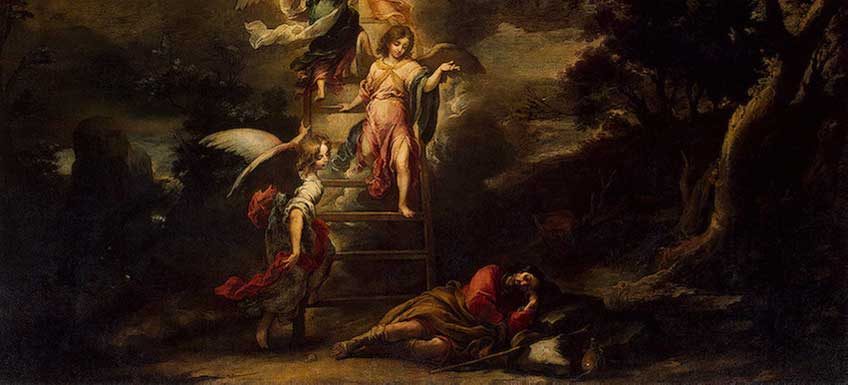It was an unexpected place to experience a vision. Jacob, according to the story in Genesis 28, was leaving home. The announced purpose of his journey was to find a wife. But there were other factors at play. Jacob had cheated his brother, Esau, and lied to his father, Isaac. It would be better for everyone if he were away from home for a while. Going to find a wife was not really Jacob’s idea. It was a convenient ploy put forward by his mother, Rebekah.
It is hard to determine whether Jacob felt more pride in outsmarting everyone at home or more shame at having irrevocably ruined relationships in his family.
It was his first night away. He slept out under the stars with a stone for a pillow. I have often wondered whether that was symbolic. Or, maybe, that’s the meaning of the phrase “between a rock and a hard place.”
During the night Jacob experienced a vision: a dream of a ladder or stairway going up to heaven. In his dream there was not only a ladder. God was standing there, offering a covenant to Jacob and saying, “Know that I am with you, and will keep you wherever you go.” And then the scripture says, “Then Jacob woke from his sleep and said, “Surely the Lord is in this place—and I did not know it.”
What did Jacob mean? What was it that Jacob did not know? The usual interpretation is that Jacob is surprised that God would be present. Why would he be surprised? We could suggest it is no accident that the verse starts “Then Jacob woke from his sleep.” The dream he had while asleep caused him to awake to God when he was not asleep. Maybe Jacob was not used to being fully awake to life.
It is difficult to find someone who goes through life quite awake. We are surrounded by distractions. There are realities we fear to face. If we should become aware, we might find God in more places than we assumed. We image Jacob thinking, “If God is here and I didn’t know, then perhaps God has also been other places where I didn’t know it.”
A favorite line from Elizabeth Barrett Browning: “Earth’s crammed with heaven, and every common bush afire with God. But only he who sees, takes off his shoes. The rest sit round it and pluck blackberries.” So far, in his life, Jacob had only been plucking blackberries.
Perhaps Jacob meant he was surprised God would appear to him, given the unsavory character of his history up to this point. One is not surprised to find God on Vesper Hill at church camp. And when one witnesses those rare and sacred moments of life such as grace, or forgiveness, or deep love, then one instinctively senses the presence of God. It is more rare to find God when life is in a jumble and there is nothing but a stone for a pillow. Only the most observant know that God is present at all times.
The usual interpretation—that Jacob did not know God was there—makes good sense from our English translations. Understanding Jacob’s comment grows more complex when we learn that there is an extra word in the original. Literally translated, the Hebrew sentence would read: “Surely the Lord in this place and I knew not I.” Faced with sentences like that, it is easy to see why translation can be difficult business. Lawrence Kushner wrote a book in which he explored at least seven different ways Jacob’s sentence could be understood.
With that extra word “I,” Jacob’s sentence could mean, “God is here, but I did not know myself.” I believe Jacob is right in recognizing that a meeting of God leads one to ask “Who am I?” I also suspect that Jacob has only just begun to ask that question. He will have miles to go before he wrestles with God enough to discover his real name in Genesis 32:22-32.
Once I read that prayer involved “fearless self-inventory.” I think that’s rather optimistic. Even in prayers of confession, I suspect that very few of us have the courage or the ability to probe deeply into the mystery of ourselves. And it seems that the world connives with us to avoid “fearless self-inventory.” As Jeremiah observed (Jeremiah 17:9), “The heart is devious above all else; it is perverse—who can understand it?”
When Jacob had a vision of the ladder between himself and heaven, it may be the first time he recognized that there is a dimension in his life that he did not know.
Yet there is another way to understand Jacob’s words. “Surely the Lord is in this place and in me. I did not understand that.” I believe there is a sense in which we are in God and something of God is within us. It may be related to the invitation of Jesus, “Abide in me as I abide in you” (John 15:4). The Sufi spiritual writer al-Ghazali once said, “Know that the key to knowing God is to know your own self.”
The Quakers have frequently challenged us to respond to that of God in everyone. I have tried, with a minimum of success, to rise to that challenge. But, like Jacob, I find the hardest part is to respond to that of God within me. Jacob would be transformed if he could realize that his name is a part of God’s name.
An ordained minister, Bob Bowman is professor emeritus of religion at Manchester University, North Manchester, Indiana.


